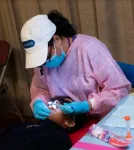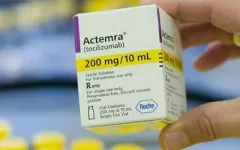(Press-News.org) LOS ANGELES -- COVID-19 has taken a huge medical, emotional and economic toll on Americans. Now, new Keck Medicine of USC research shows that the pandemic may also have harmful indirect consequences.
Alcohol and tobacco sales nationwide rose in the early months of COVID-19, according to a study appearing in the Annals of Internal Medicine today. From April - June 2020, researchers found that sales of these substances increased 34% and 13% respectively when compared to the same months in 2019.
"These are significant jumps, and show that the stress, boredom and loneliness caused by the pandemic may have led to increased alcohol and tobacco use," said Brian P. Lee, MD, MAS, a hepatologist and liver transplant specialist with Keck Medicine and the USC Institute for Addiction Science, and lead author of the study.
Tobacco and alcohol abuse are the second and ninth largest contributors to global deaths, causing some eight million deaths each year worldwide.
Lee and his colleagues decided to study alcohol and tobacco purchasing patterns after noticing that in 2020, Keck Hospital of USC admissions for alcohol-associated liver disease (cirrhosis or alcoholic hepatitis) were up approximately 30% compared to the year before. Some patients also admitted to using alcohol to handle pandemic-related stressors.
The doctors wondered if the trend they were witnessing locally was also happening nationally. And if one substance was being abused, they wondered if a second -- tobacco -- might be as well.
Seeking national data, they turned to the Nielsen National Consumer Panel, which tracks the spending habits of approximately 70,000 households in the United States over time and is designed to be nationally representative. People are given a handheld scanner or use a smart-phone app to scan products at stores to report their purchases.
Researchers compared alcohol and tobacco sales between the months of April - June in 2020 with the same time period in 2019. They set up controls to offset extenuating factors, such as restaurants and bars being closed during these months, which could independently cause an uptick in alcohol sales.
When they calculated their results, they found that from 2019 to 2020, tobacco sales increased in households across all demographics and alcohol sales increased across nearly all demographics as well. Sales increases for both substances were the highest, however, among younger adults, ethnic minorities, those with younger children and/or large families and those with higher incomes.
"We hypothesized that these subgroups, such as those with younger children, were buying more alcohol and tobacco because they felt more stressed than other segments of the population," said Lee, who is also an assistant professor of clinical medicine at the Keck School of Medicine of USC. "For those with a higher income, sales might have increased simply because they have greater disposable income," he added.
The data also revealed that sales of hard liquor increased more than wine and beer, a result Lee found troubling. "Liquor has the highest alcohol content and could be a sign of problem drinking," he said.
Lee believes that the study may reveal a previously unrecognized COVID-19-related public health issue. "This study draws attention to the fact that many people across the country might be self-medicating as a way to cope," he said. "By spotlighting this issue, individuals can identify this behavior as potentially harmful and substitute drinking or smoking with healthier activities. Mental health professionals and medical institutions, in addition to policymakers, can also develop interventions to help them."
Other Keck Medicine physicians involved in the study are Norah Terrault, MD, a Keck Medicine gastroenterologist and chief of Gastroenterology and Liver Diseases at the Keck School; Jennifer Dodge, MPH, an assistant professor of research medicine and preventive medicine at the Keck School; and Adam Leventhal, PhD, a professor of preventive medicine at the Keck School.
The researchers hope to conduct further studies to see if this three-month trend has sustained throughout the pandemic.
INFORMATION:
For more information about Keck Medicine of USC, please visit news.KeckMedicine.org.
GALVESTON, Texas -A team from The University of Texas Medical Branch at Galveston (UTMB) focused on drug addiction research have pioneered a new way to study frustration as a factor in substance use disorders. The study was published in the medical journal Psychopharmacology.
Traditional addiction research has focused on three aspects of substance use disorders: craving, impulsivity, or habit. Scientists hypothesized that a fourth factor, frustration, could also lead to escalation of drug use and addiction.
The Psychopharmacology paper noted that research into the role of frustration and substance use disorders ...
Philadelphia, Pa. -- More than one out of every 10 seniors (10.5%) enrolled in a Medicare Advantage plan, also known as a Medicare managed care option, and living in a rural area, switched to traditional Medicare during 2010-2016. The switch was driven primarily due to low satisfaction with care access, according to a study published this week in Health Affairs from researchers at Drexel University's Dornsife School of Public Health. By contrast, only 1.7% of rural traditional Medicare enrollees made the switch to Medicare Advantage during this period.
The findings, among the first to look ...
Early exposure to tough conditions--particularly warmer waters and nightly swings of low oxygen--could leave lasting scars on oysters' ability to grow meaty tissue. A team of biologists at the Smithsonian Environmental Research Center (SERC) reported the discovery in a new study, published online Feb. 26 in the journal Ecological Applications.
Eastern oysters in Chesapeake Bay live mostly in shallow tributaries. It's a rough environment for shellfish that can't move. During hotter months, oxygen levels can swing drastically, from perfectly healthy ...
Three studies - one each in Science, Science Translational Medicine, and Science Immunology - reveal the promise of newly engineered bispecific antibodies, including by demonstrating their power against previously inaccessible tumor cell targets for the first time, in two cases. These bispecific antibodies, which simultaneously bind to tumor antigens and T cells, cleared cancer cells without damaging healthy cells in mouse tumor models and/or cell culture experiments, across the three studies. The results highlight the therapeutic potential of this antibody type, which - unlike engineered immune cell therapies like CAR T - does not have to ...
In the middle of the Indian Ocean lies some of the last coral reef wilderness on Earth. The Chagos Archipelago, a collection of atolls, including Earth's largest - the Great Chagos Bank- is home to reefs that have been largely undisturbed by humans for the last 50 years. Some estimates indicate the Chagos Archipelago may contain more than half of the healthy coral reefs remaining in the entire Indian Ocean. These reefs are protected both by their remote location, and in one of the world's largest no-take marine reserves--the British Indian Ocean Territory (BIOT) marine protected area.
In 2015, scientists at the Khaled ...
Youth enrollment in Medicaid managed care across all states increased from 65 percent in 2000 to 94 percent in 2017.
Across the country, receipt of preventive care for youth in Medicaid managed care increased from 49 percent in 2000 to 59 percent in 2017, falling short of the 80 percent annual goal set by the Centers for Medicare and Medicaid Services (CMS).
Receipt of preventive care for youth in Medicaid managed care showed a significant increase in 17 states, a significant drop in six states, and no change in 28 states. Tennessee had the largest increase in preventive care associated with Medicaid managed care, while North Carolina showed the largest decrease.
Nationally, the number of children under age 21 enrolled in Medicaid grew from ...
A school-based cavity prevention program involving nearly 7,000 elementary school students reduced cavities by more than 50 percent, according to a study led by researchers at NYU College of Dentistry. The findings are END ...
White blood cells or lymphocytes are the soldiers of our immune system that patrol the body via the lymphatic system. While their primary role is to protect the body by scavenging invaders, they can sometimes go rogue and become the enemy. Lymphoma, a type of blood cancer, results from the uncontrolled proliferation of lymphocytes. They are classified as Hodgkins and Non-Hodgkins lymphomas on the basis of the cell of origin and clinical characteristics. Of them, diffuse large B-cell lymphoma (DLBCL) is the most common Non-Hodgkins lymphoma and is highly aggressive and fast-growing.
A combination of rituximab plus cyclophosphamide, doxorubicin, vincristine, and prednisone (R-CHOP) is the standard treatment regimen for ...
In a new commentary for the journal Science, an associate vice president for research at The University of Texas at Arlington argues that emerging protein-based immunotherapies could lead to highly effective "off-the-shelf" cancer treatments for more patients.
Jon Weidanz, who also is a professor in the College of Nursing and Health Innovation at UTA, is the author of a perspective regarding the development of cancer immunotherapies.
His article, "Targeting cancer with bispecific antibodies," will appear in the March 5 edition of Science. It evaluates the findings of three studies by researchers at Johns Hopkins University and proposes that an emerging ...
In a study published online February 25, 2021 in The New England Journal of Medicine, a repurposed drug used to treat arthritis did not significantly improve the outcomes of patients with severe COVID-19 pneumonia.
Results of the Phase III clinical trial, conducted by an international team led by senior author Atul Malhotra, MD, research chief of pulmonary, critical care and sleep medicine at UC San Diego Health, found that tocilizumab did not significantly improve clinical status or mortality rate at 28 days for participants who received it compared to a placebo.
"Although our trial was negative based on primary outcomes, we did see some benefits, including an improvement in length of stay of eight days ...





